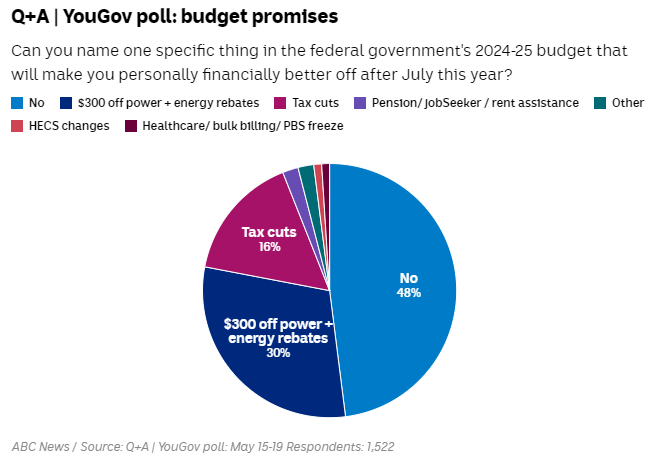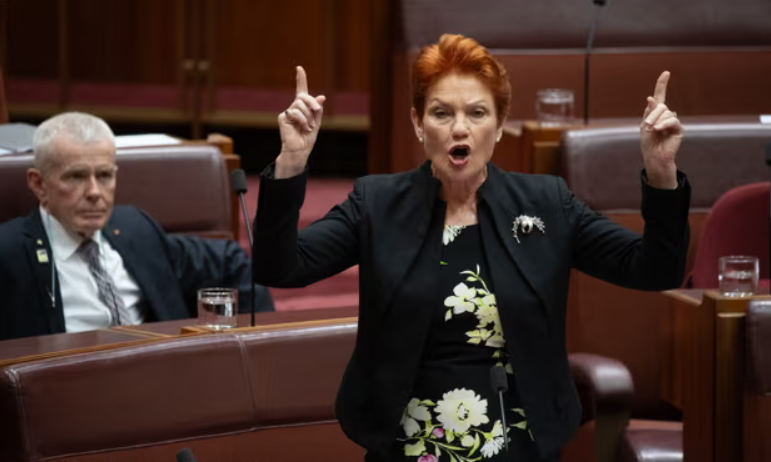
Just over half of Australians polled in exclusive research for Q+A believe the federal budget will leave them better off, with many sceptical the government can deliver secure and affordable housing.
A YouGov survey commissioned by the ABC’s live audience show also reveals 58 per cent of Australians believe the country is heading in the wrong direction in the wake of the budget.
However, the survey shows overwhelming support for the billions of budget dollars pledged for local industry as part of the government’s Future Made in Australia policy.
The budget feedback is a reality check for the government on how much its promises are cutting through — and the ongoing financial stress being felt around the country — with a federal election due within 12 months.
And it’s a telling report card for Jim Chalmers, who’s been exhaustively selling his third budget as treasurer in a round of interviews and speeches — and who faces his own electorate tonight in a live Q+A from Logan, south of Brisbane.
Before the budget, fewer than one in five Australians polled by YouGov could name anything the government had done to make them financially better off since coming to power.
In the new survey since the budget was handed down last Tuesday, that rose significantly, with 52 per cent able to name something that will make them better off. A third of those surveyed identified the $300 rebate on power bills for all households.

Younger Australians were the most disengaged from the budget and struggled the most to identify any initiative that would boost their finances (just 30 per cent aged 18-24).
Q+A has partnered with the global research, data and analytics group YouGov to capture what Australians think in key areas of policy and debate — and how that sentiment aligns with the messages from political leaders.
The poll of 1,522 people was conducted online and weighted to reflect demographics and past voting patterns for a politically representative sample.
YouGov is a founding member of the Australian Polling Council and complies with its code of conduct and data transparency obligations.
Australians back future made here
The government has put local production at the centre of its economic agenda ahead of the next election — and Australians are largely united behind them.
The Future Made in Australia policy commits $22 billion to incentives and subsidies for strategically important industries in mining and manufacturing, particularly around green energy to reach net-zero emissions.

An overwhelming majority — 87 per cent — told YouGov they support the policy.
“The Future Made in Australia policy enjoys unifying support across every party and voter demographic in Australia,” Paul Smith, YouGov’s director of public data, said.
“That is very rare for any government policy announcement.”
Opposition Leader Peter Dutton has attacked the spending targeted at green energy and mining critical minerals, calling it “corporate welfare for billionaires” that “doesn’t help the economy, or make your life easier”.
But there was broad support across voter groups, with 82 per cent of Coalition voters backing the policy.
Australians have different priorities on where they think the money should be spent, though.
Given a choice of options, and a range of spending, the most popular was investing in medicines and medical science (19 per cent) over the government’s targets in critical mineral processing (11 per cent) and solar panels and batteries (10 per cent).
Less than half (44 per cent) of respondents allocated spending to areas covered by the budget.
Seven in 10 worried about housing
There’s much less confidence in the government’s strategy to address the housing crisis, despite tens of billions of dollars in investment.
Asked whether the total $32 billion federal spend will deliver secure and affordable housing for most Australians, a quarter said no. Just 5 per cent said they were “very confident” in the plan.


A big majority of Australians have also told the government to boost welfare for the unemployed.
Three-quarters of those polled said the current JobSeeker rate of $763 a fortnight should be lifted in line with other advanced economies.
Q+A | YouGov Poll: JobSeeker
A report in 2022 found JobSeeker was the lowest allowance for short-term unemployment among all 34 advanced global economies in the OECD (Organisation for Economic Co-operation and Development). Do you think JobSeeker should be in line with at least the OECD average?

The government boosted payments by $80 last year but didn’t add to that in the budget, despite persistent campaigning from crossbench politicians and welfare groups.
The government’s Economic Inclusion Advisory Committee also recommended a boost, arguing Australia’s payment for short-term unemployed was last on a list of OECD nations.
“There’s more than one way to help people who are especially vulnerable, including the jobless, energy rebates, rent assistance and in other ways too,” Mr Chalmers said when challenged on JobSeeker last week.
Asked if they could live on the current payment and cover essential bills and living costs, only 22 per cent of those polled by YouGov said they could. (Q+A / By Jason Whittaker)

